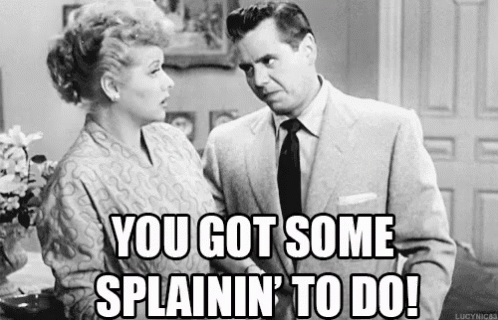07 June 2023 | Sales
Will they? Or won’t they?
By Gabrielle "GB" Blackwell
I cannot stress this enough — coming to the conclusion that a rep is unwilling should be an absolute last resort.
Too often, I’ve seen managers and second line leaders assume that all hope is lost when reps aren’t hitting their numbers, because they’re simply unwilling to perform.
🥵 Hot take: Often, it’s a manager unwilling to do the hard work to blame for a rep labeled ‘unwilling’ . Oh yes, managers can be unwilling too!

Without taking the time to assess things appropriately, managers risk making a not-so-great situation much worse. Think: broken trust in management and people checking out mentally.
To avoid the sh*tstorm of misjudging a rep’s willingness, be sure to check that reps:
- Understand what’s expected of them and why
- Are okay in their personal lives
- Don’t have an incentive to underperform
Once you’ve triaged this list, then and only then should you begin to see unwillingness as the major factor impacting performance.
Assist: If you’re doing the work to properly assess rep willingness and still are perceived as not doing enough or being unwilling as a manager, make sure to 👏🏽show 👏🏽 your 👏🏽 work !
Are they lacking buy-in?

If your reps are being told to do something and you haven’t shared the “why” behind it, they might not be bought into what you’re asking of them.
The remedy: Sharing the context behind why you want them to move in the direction you’re asking them to.
Remember, a large part of your role is helping reps connect the dots between the work they’re doing and the company’s vision. To do this, consider what data points or resources you can share that will help your reps recognize and accept the ‘why’.
Assist: “Data” can be as simple as showing the math behind a decision. If numbers aren’t always enough to get your people inspired (they rarely are, btw) consider having an inspirational senior leader come in and talk to your team about what’s in it for them. Framing things in terms of upside rather than burdens or hindrances might unlock the buy-in you need!
What’s happening in their 5-to-9?

You will always need to consider if there’s something going on in your rep’s personal life that would explain their perceived unwillingness:
- Grieving loss — breakups, divorce, passing of a loved on, etc
- Health status — new injuries or illnesses, managing chronic illness or health concerns, etc
- Increased caretaker responsibilities — new parent, taking care of aging parents, etc
- When the state of today just freaking sucks — local school shootings, violence against people within a community your rep identifies with, policy changes that could adversely impact your reps, etc
If a rep is dealing with something personal, it makes sense that they may appear unwilling to do the work — they simply do not have the mental or emotional space to tackle the work sustainably.
If it’s something personal blocking your rep performing, this is where you’ll want to consider what’s best for your rep as a person, not just a professional. Helpful questions to reflect on:
- Does your rep simply need someone to listen to them and validate their experience?
- What Employee Assistance Programs does your rep have access to that will help them navigate their situation?
- How can your HR Business Partner advise you through this situation so you have the support you need to best support your rep?
Assist: If you notice your rep isn’t showing up in the way they need to, especially if they’ve been someone you didn’t have to worry about prior, be really intentional about checking in on them in your one-on-ones. If they seem low energy, distracted, or quieter than usual, find a way to kindly bring that up. For ex: “Hey, it seems like there’s something getting in the way of performance. Also, I can’t help but notice how your energy levels have gotten lower over the past few weeks. How is everything?”
Are you incentivizing the wrong things?

Imagine you have a rep on your team who is pacing behind and struggles with being consistent on weekly activities. This same rep finds out about a cross functional project they really want to be a part of. It’s not a big time commitment and you know your rep would be a great addition to the project.
Do you give them the green light to join the project?
Or do let them know that, given their performance, this isn’t something they’ll be able to explore?
If you went with the former — give the rep the green light — you may be incentivizing your reps to underperform. I mean what’s the incentive to do well if you’re going to give me more opportunities even when I’m not holding up my end of the sales performance bargain?
If there are unintended rewards for underperformance, make the appropriate adjustments so reps aren’t as incentivized to settle for less-than-acceptable.
When it’s time to call it

There’s always the possibility that someone is unwilling to do the work because they don’t want things to work out. This typically happens when rep expectations cannot be met by their employer. Examples of how this shows up:
- The rep believes in the company mission and takes a job in sales under the assumption they’ll be able to move to a different part of the company. With no career pathways out of sales, the rep loses the willingness to perform.
- A high performing rep from a well-established, well-resourced but stodgy company moves to a high growth company that seems more exciting. Upon joining the new company, they’re shell-shocked by how much more work it takes to notch a win. Without the structure, enablement and assets that a well-established company can provide, the rep feels stuck and begins to disengage from the work.
- The expectations of the role change and become something that an in-seat rep did not willingly sign up for. The rep loses interest in making things work at the company in the role as-is and does not put in the effort to maintain an acceptable level of performance.
If you believe you have a rep who falls under these buckets, the best thing you can do as a manager is be clear with your reps. This includes:
- Reintroducing what is expected of your reps
- Restating the potential consequences of falling below expectations
- Providing timely and direct feedback when expectations are not being met
- Documenting expectation setting conversations and sharing written notes with the respective rep
Assist: If a rep really doesn’t want things to work out and you hold them accountable to the expectations, they may begin to ‘thrash’. ‘Thrashing’ can look like reps bad mouthing the company and/or you to other reps on the team or questioning your abilities as a manager. If you are clear in your expectations, provide timely and direct feedback, and document your conversations, you’ll have a much easier time managing towards an appropriate resolution.
No one said it’d be easy. They said it’d be worth it.
When reps start showing an unwillingness to do the work, it can be really easy to write them off as a lost cause. But managing people is anything but easy.
Rather than jumping quickly to the assumption your rep is hopeless, take the time to review where you can show up better for them. At worst, you’ll have given someone the benefit of the doubt who didn’t need it. At best, you’ll have given someone the benefit of the doubt who absolutely deserves it.
Either way, you’re doing the work to feel confident in your decision.
And when you take the time to assess where unwillingness is really coming from, you’ll give your team a greater sense of confidence in how you make decisions when reps are falling behind.
That’s not too bad of a place to be.